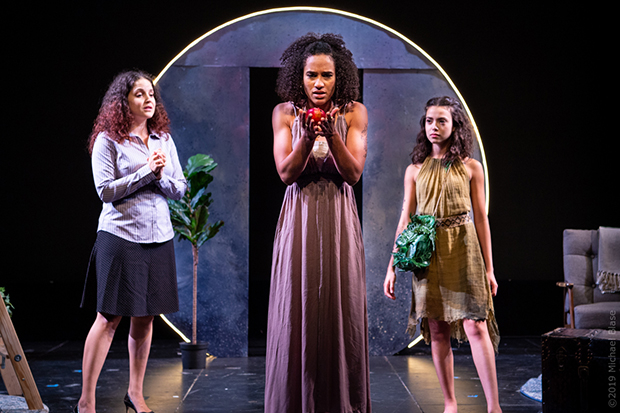NYMF Reviews 2019: Black Hole Wedding and Leaving Eden

(© Shira Friedman)
Black Hole Wedding
By Sarah Grace Drinkwine
Black Hole Wedding has a fantastic premise: shy MIT grad Raymond (Jonathan Miller) has to save his fiancée, Summer (Mimi Robinson), from his prototype black-hole trash compactor — exactly what it sounds like — after it is stolen by evil oil baron Mr. Dean (Sean McDermott). This is the setup of a musical that trades its brain for a sense of pure fun and promises to pay comedic dividends. Instead, this musical lives up to its title — a black hole that swallows almost every potential charm.
Show creators Paul Nelson and Katherine Brann-Fredicks falter with the cast of comedic characters. Stereotypes do have a place in comedy, but only when paired with nuance and good jokes, Here, the engineers talk like the cast of Big Bang Theory — complete with a Trekkie fanboy who calls himself Spock (Lukas Poost) — and a security guard (Jay Ellis) has a sexual obsession with Summer that is played off as a gag. This brand of casual workplace harassment is so deeply baked into this musical's sense of humor that the experience of watching the show becomes legitimately uncomfortable more than once.
Not that this musical is bereft of funny scenes. In one of them, the black-hole trash compacter goes haywire and sucks up a bunch of stuff: the action is performed by actor in a black morph suit dancing across the stage, stealing props from characters who react with serious shock and horror. This exact scenario plays out twice, and each time it's the funniest thing of the entire show.
In the end, though, the musical's shortcomings, including bland numbers that don't really contribute much to the story at all, are epitomized in its most interesting character: Georgina is a "booth babe" (a model hired to attract customers to a trade show booth) who spends the musical's first half reading an upside-down physics textbook. When asked about it, she responds with her only lines of dialogue: "City College had it half-price because the cover's on upside down," followed by "[Boss] calling. Gotta go play bimbo." Nelson and Brann-Fredicks created a fully realized character with only two lines of spoken dialogue. Had this been Georgina's story, Black Hole Wedding would have been a universe full of life and substance, rather than a troubling musical utterly lost in space.

(© Michael Blase)
Leaving Eden
By Hayley Levitt
Leaving Eden redeems the tarnished name of Adam's first wife Lilith — the woman whom God made from the same clay as Adam but who earned demon status for refusing to be subservient. Featuring music by Ben Page, a book and lyrics by Jenny Waxman, and direction by Susanna Wolk, the show tells two side-by-side stories about Adam, Eve, and Lilith: One, the untold biblical romance between ancient Adam (Ian Ward) and Lilith (Sarah-Anne Martinez), with a late entrance by the oblivious but tempted Eve (Gabrielle McClinton); the other, a modern-day mess of sexual politics surrounding Adam (Azudi Onyejekwe), his girlfriend, Lily (Janet Krupin), and their friend Eve (also Gabrielle McClinton), who seduces Lily into an affair, but then is invited into the relationship to help the barren couple bear a child (a move that's a little too reminiscent of a Handmaid's Tale ceremony for comfort).
Portions of the score straddle both time lines (the two Adams duet about making their respective partners happy in "Ménage à Song"), but the thread that binds the two narratives together dissolves as the present-day story drifts off in curious directions, most of which don't inspire sympathy for the modern incarnation of our supposedly redeemed villain Lilith.
The biblical tale (which winks at the audience with sexual innuendos for comic effect) is structured like an origin story of the patriarchy. This Lilith is portrayed as capable and curious woman who gets frustrated with the patronizing Adam, who expresses his love through dominance and blindly insists he knows what "Father" wants of the two of them. There's not much of an equivalency between him and modern Adam, who quietly gives Lily space to recover both emotionally and physically from her recent hysterectomy — an event that leaves Lily questioning her own womanhood: Is she even a woman without the parts that create children? Is it third/fourth-wave-feminist enough to want to be a full-time mother?
These questions don't arise in the most organic way, but looking for answers to them at their biblical roots is still fascinating task for a musical. If Leaving Eden is going to make any progress along that line of questioning, it needs to draw a sharper picture of the road that brought us from the patriarchal Garden of Eden to this complicated sexual triangle in 2019 America. Waxman and Page end their musical with a couple of satisfying feminist anthems, but it's difficult to feel a full sense of catharsis if we're not quite sure why our leading ladies are singing them.










